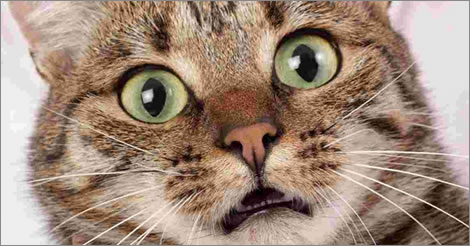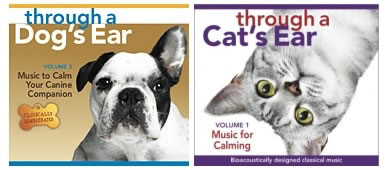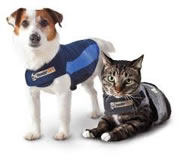9 Ways To Keep Your Pet Fear Free On July 4th
Did you know that the 4th of July weekend is the #1 weekend for lost pets taken to shelters in Springfield, MO and nationwide? Does your dog or cat have a noise phobia and become fearful, anxious, or stressed to loud noises such as thunderstorms, fireworks, etc? Are you making their anxiety worse or better? Here are some tips to try and create a more “Fear Free” holiday for everyone to enjoy:
- Remove your fearful pet from the environment if possible. It may be less stressful to take your pet to a friend or family member’s house that is away from the fireworks and noise. If that is not possible, check with your veterinarian or boarding facility to see if they have room to lodge your pet for the night or weekend.

- Create a sound-proof room or safe haven for your pets. Keep your pet in the interior most room in the home with no doors or windows to the exterior of the home. Basements make a great retreat as they are usually darker, well-insulated, and lack exterior doors or windows preventing a possible escape attempt which could lead to injury. If your pet is crate-trained, then place them in the crate with their favorite toy or blanket for reassurance. Then cover the crate with a thick towel or blanket to darken the environment and to also help buffer loud noises. Your pet will hopefully feel safe in this comfortable environment.
- Provide a musical distraction using sound therapy. Playing the radio or keeping the TV on can help muffle the sounds to outside fears and stressors. http://throughadogsear.com/ is a website that has an assortment of calming music for a variety of anxieties such as fireworks, thunderstorms, car rides, etc.

- Swaddle their fear away. Similar to swaddling infants, a thunder shirt ( www.thundershirt.com ) applies a gentle, constant pressure to help relieve stress and anxiety. It is a drug-free way to safely, effectively, and inexpensively calm your pet.

- Nutraceuticals to calm the fear away. Products that contain L-Theanine, L-tryptophan, and/or melatonin have been shown to provide a calming effect to pets. It’s better to start these products 1-2 weeks beforehand as these sometimes take time in order to reach therapeutic levels.
- Aromatherapy. Lavender and Chamomile can provide a calming effect when diffused into the room, but it is important to remember to never apply any essential oils topically to your pet without first consulting your veterinarian as some can be toxic to your pet. Feliway (www.feliway.com) and Adaptil (www.adaptil.com) are pheromones used to naturally reduce stress and anxiety in your pet and can be used for a variety of stressors. They are available in diffusers, sprays, and collars and have worked wonders for many of our patients with mild anxieties. These work best when paired with behavioral modification techniques and given for a longer period of time.

- Anxiolytics and other behavioral modification drugs. Sometimes, no matter what you do, it simply is not enough to help relieve fear, stress, and anxiety in our furry companions and that’s when you need to talk to your veterinarian about prescribing a medication to prevent the situation from escalating out of control. There are many short-acting medications that can be used such as Trazadone, Alprazolam, and Diazepam that can be given within a few hours of the anticipated events to safely reduce anxiety and will not have long lasting side-effects. We have used Trazadone for many of our boarding patients when they have become fearful of being away from home and it has helped tremendously with decreasing and/or eliminating stress-induced colitis resulting in bloody diarrhea. Talk to your veterinarian in advance as sometimes these medications need to be compounded in order to get cats to easily take them.
- “Ace” for your pet? Acepromazine was once commonly prescribed for thunderstorm and fireworks phobia because it is a great sedative. However, it may do little for the actual anxiety with noise phobias. In fact sometimes, it could make your pet more fearful and reactive to the situation. This medication is no longer recommended as a first-line therapy for anxiety and noise phobias. However when behavior modifications, nutraceuticals, and anxiolytic medications fail then it may be time to use this tranquilizer. This medication will help control vomiting as well so if your dog vomits in response to firework situations then this medication may be appropriate or another anti-emetic medication can be prescribed by your veterinarian.
- Collars, ID tags, and microchips. If all of the above fail and your pet does manage to get free and run away, make sure they have proper and up to date identification with your contact information so you can be quickly reunited. Microchips are a permanent identification that is placed under the animal’s skin so in the event if the pet’s collar or ID tag fall off or are not on your pet when they escape they can still be properly identified and returned safely home.
We hope this helps you and your pets to enjoy a safe and Happy 4th of July!
If you have any additional questions or concerns regarding your pet’s health or behavior, don’t hesitate to ask us. We are here to help!
Information for this blog post was gathered from the following websites: http://drmartybecker.com, http://throughadogsear.co/, www.thundershirt.com, www.feliway.com, www.adaptil.com, and the Fear Free certification program offered through www.Vetfolio.com.






